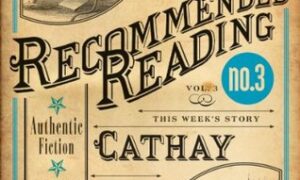 Mammoth by Douglas Perry
Mammoth by Douglas Perry
My rating: 3/5 cats



“Like I said, people scared. Doesn’t matter what about.”
i love the cover of this book. it’s not staggeringly original or anything, but that’s why i like it—it looks like 80% of the covers on my grit lit shelf, for example, so it makes me think i know what to expect:
and the description is so vague:
The small, isolated town of Mammoth View is hit with terrifying news on a summer morning: a mysterious, large-scale attack is unfolding in the surrounding forest. It’s not clear what happened, but it’s bad. And it’s not over. As residents flee in panic, Police Chief Hicks and his deputy set off into the woods to investigate.
The attack seems like the perfect coincidence for Billy Lane. Looking for the biggest score of his career, he targets the local bank. The robbery does not go well—and the aftermath is even worse, leading the robbers to a nearby running camp for teen girls.
Over the next twenty-four hours, chaos descends on Mammoth View as Billy, the police officers, and a courageous teen athlete at the camp face down murderous strangers and ghosts from their pasts—all leading back to what really happened outside of town.
i wasn’t sure if this was going to be grit lit or some sort of supernatural/rampant animal attack/apocalyptic weather disaster storyline.
turns out, it’s none of those things. and it’s not at all bad, but it’s like when you see a mouthwatering picture of steak and french fries in your food network magazine:

and then it turns out to be an ice cream cake shaped like steak, and ‘french fries’ made out of pound cake, and you like ice cream and pound cake just fine, but your appetite was prepared for steak and french fries and now your tummy feels a little unsettled.
the beginning of this was great; i was getting a very strong Niceville vibe from it, because it is essentially the same exact setup: small town, bank robbery gone wrong, large cast of characters whose storylines contribute to an overarching narrative, atmosphere thick with tension and foreboding as the reader is dropped into something they don’t understand but are digging their journey to the slow, spooky reveal.
unfortunately, this book is one long held breath. it’s partially my fault for noting the similarities between this and Niceville and expecting the story to develop along a similar path, but reading this was a frustratingly long wait for explanations while the reader is shuttled back and forth between several different characters’ backstories and present-day experiences, wondering when they will converge or when the real threat will manifest.
the writing is good; it’s essentially a series of character studies that eventually provide satisfying closure to the events of the day, but i kept waiting for the other shoe to drop and become killer bats or earthquake-woken ancient evils, or a portal to doooom.
do not wait for these, estragon.
it’s a smalltown crime story in which the most supernatural element is the ripple effects of coincidence and misinformation. the problem is that it wants you to think it might go supernatural at any moment, because it keeps dropping all these very ominous pronouncements that activate your spooky-detectors.
“Something’s happened,” Lloyd said, looking up as he squeezed Jamison’s wrists.
“I can see that.”
Lloyd’s eyes followed his boss’s, landed on Jamison’s contorted face. “Right,” he said. “But, I mean…out there. In the world.”
and by out there, in the world, we really mean the small california mountain town of mammoth view, which a reader who is still thinking her ice cream is a steak cannot be blamed for noting has some characteristics similar to those small towns in the work of stephen king, or wayward pines, perhaps.
With all its quaintness—the brick facades and curlicue store signs—Mammoth View didn’t feel like a real place when there wasn’t snow on the ground. It felt like a mistake, a town removed from its proper time.
and from another POV:
The town made Billy uncomfortable, too. It had nothing to do with the fact that he’d left a dead man in the bank down the street, though that didn’t help. It just felt creepy. The town was what snobs called picturesque, and what he called fake. Even the grocery seemed more like a gingerbread house. He wouldn’t be surprised if he peered behind the row of soda bottles in the refrigerated aisle and found elves back there stocking shelves and cackling.
add to that the ambiguity and the oddness of the events as they unspool—and as the reader is exposed to them, where no single character has all the information, so we learn bits and pieces from people who only have part of the story—they see blood on a stone but don’t know how it got there, they see smoke in the distance and do not know its source. these bits and pieces, taken singly, are commonplace, or at least explainable, but are rendered uncanny by juxtaposition and insinuation, by the author’s sustaining that ominous tone and withholding all the information until the very end.
parts of the whole, in no particular order:
the town is evacuated suddenly after reports of an invasion, there is a small earthquake, gunshots are heard, a bank robbery goes sideways, there are several explosions and a large fire, stores are looted, people are killed, others are abducted, phones are down, radio stations spotty, there are many unconfirmed reports of attacks of unspecified origin, there are mysterious, half-glimpsed animal shapes in the woods, general panic, roadblocks, aggressive drivers, rumors, a missing police officer, miscommunication, smalltown bullies taking advantage of the confusion to go buck wild, etc…
and that’s plenty to shape a regular crime story around, but then he’ll write scenes like this:
“I know you’re all scared about what you’re hearing on the radio,” she said, her voice a little wobbly at first. “None of us is entirely sure what we heard. But this much we know for sure; you’re safe here.”
Tori glanced at Eileen, who had let her eyes drop to her shoes. Tori knew what Eileen was thinking. They weren’t safe anywhere. They never had been.
that imply SO MUCH DRAMA, potentially of the spookyspooky kind, but there’s no payoff, in that particular case. that scene sets up a reader’s expectations for some big freaking reveal like, “they had never been safe because of the annual piranha invasions” or “because they live in shirley jackson’s lottery town,” but no. they are just ordinary girls, leading ordinary lives (although one girl is infinitely cooler than the other). i’m just not sure what that set-up (and others like it) are meant to do, other than red herringly mislead the reader, and there are better ways to do that.
it’s not always that clunky—there’s nothing spookier than a deserted small town, and this scene of an empty diner, meals abandoned, food congealing, plays both sides well:
He walked around the counter and pushed through the kitchen’s swinging door. The grill had been turned off, but the food hadn’t been put away. A mound of meat sat at the back of the grill, the bottom layer flattened out and stiff from overcooking. Uncracked eggs still patiently queued on the side table. There was a bowl of diced tomatoes. A block of cheese. Butter. Cooked fries sat in their baskets above the oil vat. The makings of a feast.
wheeeere did they gooooo?
i honestly don’t know how i feel about this book. on the one hand, it’s a well-told smalltown story with strong characters, an intricate plot, and it holds the reader’s interest throughout.
on the other hand, it’s this bewildering fermata whose tension is sustained far too long for the modest scale of its conflict, so looking back at the plot after knowing everything kind of diminishes it.
he’s absolutely an author i would read again, but not when looking for my spooky fix.
******************************************
huh.
i honestly don’t know how to describe what i just read. i’m sure i’ll figure it out, but right now i’m struggling with the chasm between what i thought this book was going to be and what it actually was.
review to come.
i assume.
read my book reviews on goodreads















